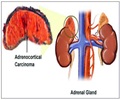Men with low testosterone were more likely to have elevated markers of inflammation, called inflammatory cytokines, which contribute to many diseases. Another characteristic that distinguished the men with low testosterone was a larger waist girth along with a cluster of cardiovascular and diabetes risk factors related to this type of fat accumulation. Men with low testosterone are three times more likely to have the metabolic syndrome than men with higher testosterone levels; metabolic syndrome is the name for the presence of three or more of these risk factors:
· waist measurement more than 40 inches in men (more than 35 inches in women),· low HDL (good) cholesterol,
· high triglycerides (levels of fat in the blood),
· high blood pressure
· high blood glucose (blood sugar)
While the study lends support to the belief that supplemental hormone therapy may help older men with low testosterone levels, those who practice weight control and increase their physical activity may also live longer.
"The study did show there may be an association between low testosterone levels and higher mortality. It did not show that higher levels of testosterone are associated with decreased mortality," explained Laughlin. Researchers agree only randomized placebo-controlled clinical trials can determine whether testosterone supplements can safely promote longer life. Such a trial is in the planning stages at UCSD.
Barrett-Connor cautioned, "We are very excited about these findings, which have important implications, but we are not ready to say that men should go out and get testosterone to prolong their lives. We’re not ready to take this to the prescribing pharmacist."
"Conventional wisdom is that women live longer because estrogen is good and testosterone is bad," said Barrett-Connor. "We don’t know. Maybe the decline in testosterone is healthy and comes with older age. Maybe the decline is bad and is associated with chronic diseases of aging."
The National Institute on Aging and the American Heart Association funded the study.
Dr. Elizabeth Barrett-Connor is founder and director of the Rancho Bernardo Heart and Chronic Disease Study, now in its 35th year. Since 1972, the RB study has greatly increased knowledge of cardiovascular disease, diabetes, cancer, osteoporosis, exogenous and endogenous hormones, and the connections between lifestyle, behavior and health. Six thousand residents, 82 percent of the original population of adults in Rancho Bernardo, agreed to participate in this history-making study and significant collection of data.
Barrett-Connor and a team of UCSD researchers have conducted clinical research visits with the participants every four years for more than three decades. The clinical research visits last three to four hours, thoroughly examining the participant’s physical condition by gathering information through bone and heart scans, blood samples, heart disease risk factor measurements such as lipid levels and cognitive function assessment. The rate of follow-up with those who have moved or died (through cooperation of family and friends), has been exceptionally high.
The RB study has just been re-funded for what Barrett-Connor predicts will be the final clinic visit. Another newly funded grant from the National Institutes of Health (NIH) will allow analysis of information gathered over the course of the study to provide new insights on the link between heart disease risk and cognitive function.
"Although more than 400 scientific papers based on RB data have already been published, it’s a wonderful legacy for participants to realize that the knowledge gathered has not come close to being exhausted. It’s an enormous bank of data," said Laughlin. "Though we are beginning the final visits with the RB group, analyzing the data from the RB study, including the new data being acquired at this final visit, will continue to contribute to our knowledge about healthy aging for years to come."
Barrett-Connor added, "We must note that this would not be possible without the remarkable contributions of our loyal participants. They are really very special people."
Source-Eurekalert
LIN/M










